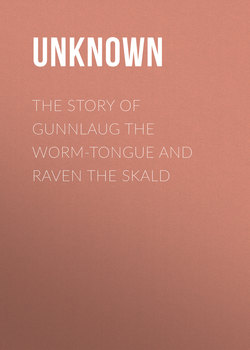Читать книгу The Story Of Gunnlaug The Worm-Tongue And Raven The Skald - Unknown - Страница 2
На сайте Литреса книга снята с продажи.
CHAPTER II. Of Thorsteins Dream
ОглавлениеOne summer, it is said, a ship came from over the main into Gufaros. Bergfinn was he hight who was the master thereof, a Northman of kin, rich in goods, and somewhat stricken in years, and a wise man he was withal.
Now, goodman Thorstein rode to the ship, as it was his wont mostly to rule the market, and this he did now. The Eastmen got housed, but Thorstein took the master to himself, for thither he prayed to go. Bergfinn was of few words throughout the winter, but Thorstein treated him well The Eastman had great joy of dreams.
One day in spring-tide Thorstein asked Bergfinn if he would ride with him up to Hawkfell, where at that time was the Thing-stead of the Burg-firthers; for Thorstein had been told that the walls of his booth had fallen in. The Eastman said he had good will to go, so that day they rode, some three together, from home, and the house-carles of Thorstein withal, till they came up under Hawkfell to a farmstead called Foxholes. There dwelt a man of small wealth called Atli, who was Thorstein’s tenant Thorstein bade him come and work with them, and bring with him hoe and spade. This he did, and when they came to the tofts of the booth, they set to work all of them, and did out the walls.
The weather was hot with sunshine that day, and Thorstein and the Eastman grew heavy; and when they had moved out the walls, those two sat down within the tofts, and Thorstein slept, and fared ill in his sleep. The Eastman sat beside him, and let him have his dream fully out, and when he awoke he was much wearied. Then the Eastman asked him what he had dreamt, as he had had such an ill time of it in his sleep.
Thorstein said, “Nay, dreams betoken nought.”
But as they rode homeward in the evening, the Eastman asked him again what he had dreamt.
Thorstein said, “If I tell thee the dream, then shalt thou unriddle it to me, as it verily is.”
The Eastman said he would risk it.
Then Thorstein said: “This was my dream; for methought I was at home at Burg, standing outside the men’s-door, and I looked up at the house-roof, and on the ridge I saw a swan, goodly and fair, and I thought it was mine own, and deemed it good beyond all things. Then I saw a great eagle sweep down from the mountains, and fly thitherward and alight beside the swan, and chuckle over her lovingly; and methouht the swan seemed well content thereat; but I noted that the eagle was black-eyed, and that on him were iron claws: valiant he seemed to me.
“After this I thought I saw another fowl come flying from the south quarter, and he, too, came hither to Burg, and sat down on the house beside the swan, and would fain be fond with her. This also was a mighty eagle.
“But soon I thought that the eagle first-come ruffled up at the coming of the other. Then they fought fiercely and long, and this I saw that both bled, and such was the end of their play, that each tumbled either way down from the house-roof, and there they lay both dead.
“But the swan sat left alone, drooping much, and sad of semblance.
“Then I saw a fowl fly from the west; that was a falcon, and he sat beside the swan and made fondly towards her, and they flew away both together into one and the same quarter, and therewith I awoke.
“But a dream of no mark this is,” he says, “and will in all likelihood betoken gales, that they shall meet in the air from those quarters whence I deemed the fowl flew.”
The Eastman spake: “I deem it nowise such,” saith he.
Thorstein said, “Make of the dream, then, what seemeth likest to thee, and let me hear.”
Then said the Eastman: “These birds are like to be fetches of men: but thy wife sickens now, and she will give birth to a woman-child fair and lovely; and dearly thou wilt love her; but high-born men shall woo thy daughter, coming from such quarters as the eagles seemed to fly from, and shall love her with overweening love, and shall fight about her, and both lose their lives thereby. And thereafter a third man, from the quarter whence came the falcon, shall woo her, and to that man shall she be wedded. Now, I have unravelled thy dream, and I think things will befall as I have said.”
Thorstein answered: “In evil and unfriendly wise is the dream interpreted, nor do I deem thee fit for the work of unriddling dreams.”
Then Eastman said, “Thou shalt find how it will come to pass.”
But Thorstein estranged himself from the Eastman thenceforward, and he left that summer, and now he is out of the tale.
